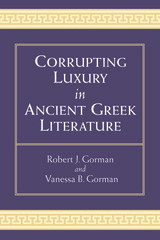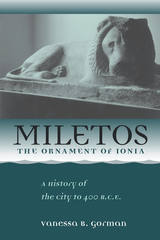2 books about Gorman, Vanessa B

Corrupting Luxury in Ancient Greek Literature
Robert J. Gorman and Vanessa B. Gorman
University of Michigan Press, 2014
A widely accepted truism says that luxury corrupts, and in both popular and scholarly treatments, the ancient city of Sybaris remains the model for destructive opulence. This volume demonstrates the scarcity of evidence for Sybarite luxury, and examines the vocabulary of luxury used by the Hellenic world. Focus on the word truphe reveals it means an attitude of entitlement: not necessarily a bad trait, unless in extreme form. This pattern holds for all Classical evidence, even the historian Herodotus, where the idea of pernicious luxury is commonly thought to be thematic.
Advancing a new method to evaluate this fragmentary evidence, the authors argue that almost all relevant ancient testimony is liable to have been distorted during transmission. They present two conclusions: first, that there exists no principle of pernicious luxury as a force of historical causation in Hellenic or Hellenistic literature. Rather, that idea is derived from early Latin prose historiography and introduced from that genre into the Greek writers of the Roman period, who in turn project the process back in time to explain events such as the fall of Sybaris. The second conclusion is methodological. The authors lay down a strategy to determine the content and extent of fragments of earlier authors found in cover texts such as Athenaeus, by examining the diction along synchronic and diachronic lines.
This book will appeal to scholars of intellectual history, the history of morality, and historiographical methodology.
[more]

Miletos, the Ornament of Ionia
A History of the City to 400 B.C.E.
Vanessa B. Gorman
University of Michigan Press, 2001
Situated on the southwest coast of modern Turkey, Miletos stood for centuries as one of the paramount cities in the Hellenic world, a gateway between the East and West. It became especially famous as the most prolific mother city in Greek history, sending out at least forty-five known primary and secondary settlements into the Sea of Marmara and the Black Sea, while at home developing into an intellectual and artistic center and one of the birthplaces of Western science and philosophy.
A history of Miletos is long overdue. Despite the significance of this city in antiquity and the important results of ongoing excavations there, the last full-scale discussion of Miletos was written in 1915. In Miletos, the Ornament of Ionia, Vanessa B. Gorman provides the first and only modern, integrated history of the city, collecting and scrutinizing sources about Miletos for the period stretching from the first signs of habitation until 400 B.C.E.
This book reviews the archaeological evidence for the physical city, demonstrates the likelihood of both Minoan and Mycenaean settlements there, and substantiates the fact of the Persian destruction and refoundation of Miletos along orthogonal lines. With insight and diligence, Gorman surveys the cults known to have existed during this period; traces the political progress of the city through monarchy, oligarchy, tyranny, and democracy; and sketches the terms of its subjugation under the Persians and later the Athenians.
Providing a detailed and up-to-date account of the development of one of the major urban centers of Asia Minor, Gorman's book will engage classicists, historians, and Near Eastern specialists.
Vanessa B. Gorman is Associate Professor of History, University of Nebraska, Lincoln.
[more]
READERS
Browse our collection.
PUBLISHERS
See BiblioVault's publisher services.
STUDENT SERVICES
Files for college accessibility offices.
UChicago Accessibility Resources
home | accessibility | search | about | contact us
BiblioVault ® 2001 - 2024
The University of Chicago Press









